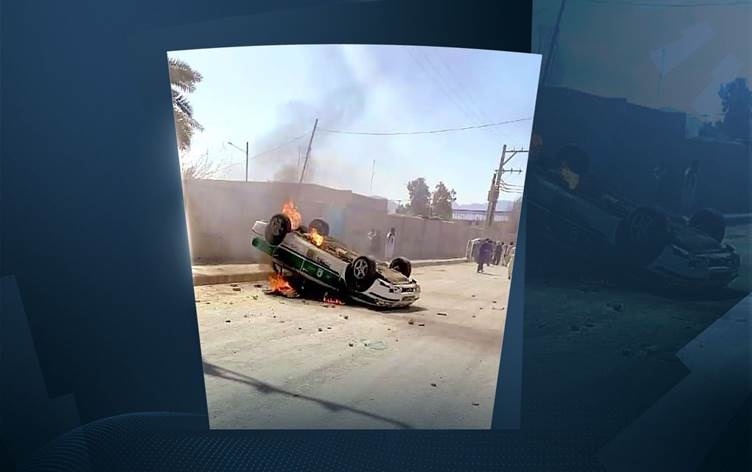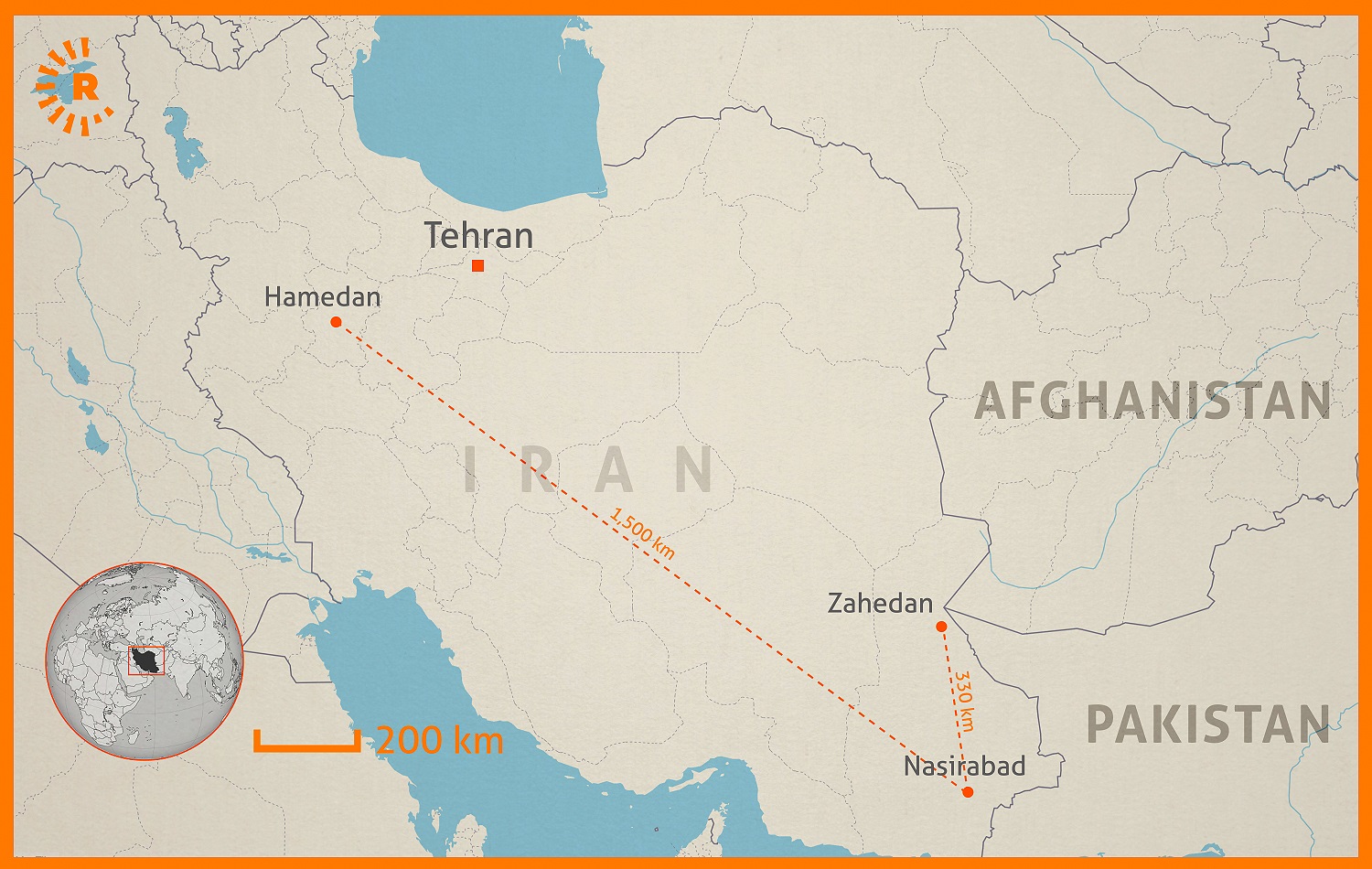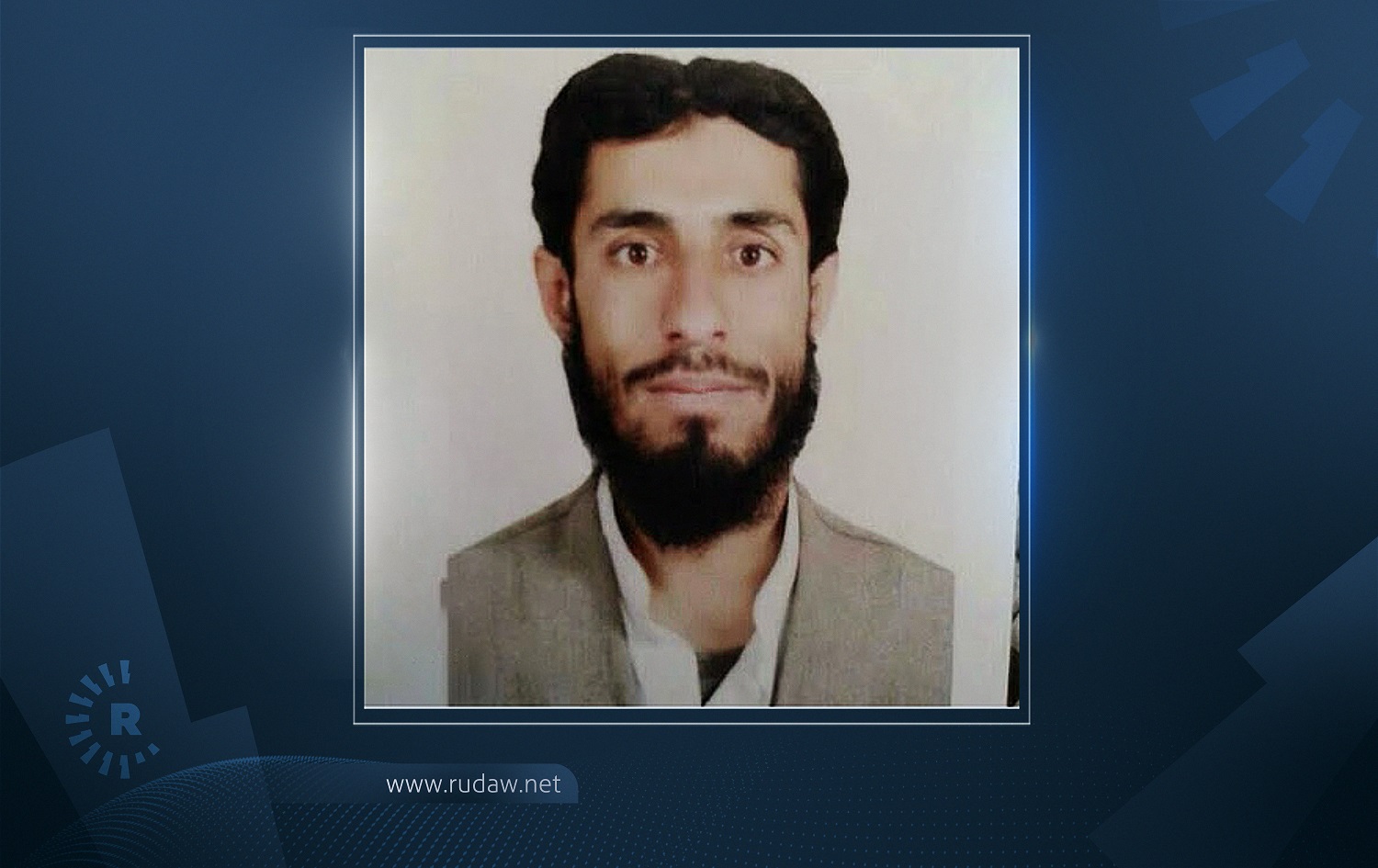ERBIL, Kurdistan Region — It was just past afternoon prayer when the agents raided the village. Their aim for the day, April 19, 2010, was to arrest a number of young Baluchi men. The raid came as no surprise to the residents of Nasirabad, in southeastern Iran; they were used to it.
Among the villagers were Ayub Bahram Zehdi and his friend Durra Shahdoost Zehdi, who, on foot, tried to stop the three agent-laden vehicles that rolled through the village. The young men were chased away by the agents who started firing, first into the air and then at the youths. Durra fell and stumbled towards his house, where his sister and mother watched him collapse, a pool of his own blood quickly surrounding him. Ayub, 27 years old, was taken away by the agents. Durra’s body, punctured by a gunshot to the chest, was taken away in the back of a Peugeot, his corpse only given to his family three days later.
Thousands of young Iranian men like Ayub and Durra had been arrested and dozens killed a year earlier, when millions of people defied the authorities and protested a rigged presidential election. But Iran's Baluchis and other ethnic minority citizens have been a particular target of the state both before and after the 1979 revolution. In the latest example, at least 21 Baluchis have been executed since mid-December, sent to the gallows on what are believed to be trumped up charges. In February, the Islamic Revolutionary Guard Corps (IRGC) killed ten fuel traders in the province, and in response, protesters torched government buildings and police vehicles and clashed with security forces. Hundreds were detained in the aftermath.
Iranian officials including Supreme Leader Ali Khamenei have repeatedly labelled Sunnis and Shiites as brothers. Speaking a few days after some of the most recent executions, President Hassan Rouhani said that everyone was equal before the law under his government. “Our pledge was based on equal social rights for everyone. There is no Sunni or Shiite, no man or woman, and we have practically achieved this in our government,” Rouhani told the cabinet on February 3 of this year. “We even have a Sunni Baluchi ambassador in our government,” Rouhani said in reference to Homeira Rigi, who was appointed ambassador to Brunei in January 2019.
However, Sistan and Baluchestan suffers from chronic underinvestment from the government in all fields. The province ranked last in the country in a 2013 study that used the Human Development Index, which takes life expectancy, education and per capita GDP into account. In Nasirabad, over 80 percent of the population lives below the poverty line.
“Baluchis (and other ethnic minorities) face discrimination that curtails their access to education, health care, employment, adequate housing and political office,” said Mansoureh Mills, Iran researcher at Amnesty International. “Sistan and Baluchestan province suffers from continued under-investment in the province by the central government, exacerbating poverty and marginalization.”

People living in the area are highly dependent on agriculture as a source of income, so as rivers, springs, and rainfall dried up, so did job prospects. Some Baluchis became migrant workers in Persian Gulf countries, coming back once a year to see their families. Many moved to other parts of Iran in search of work, including Asaloyeh, the gateway to South Pars, the largest gas field in the world and where Iran has invested billions of dollars. Others went to big cities like Tehran, to clean streets or act as porters in the bazaars. Many of those unable to head to faraway places have resorted to taking on the risky business of carrying gasoline and petrol across the borders to Afghanistan and Pakistan, like kolbars in the Kurdish west of the country that carry goods into Iraq. The porters are killed on a regular basis by the Iranian border guards.
The lack of investment shows up even worse in rural areas of the province. “Many Baluchi villagers are also denied their right to sufficient, physically accessible and safe water due to poor infrastructure, forcing them to rely on unsafe sources of water such as rivers, wells, ponds and water pits inhabited by crocodiles for drinking and domestic use, putting their lives at risk,” Mills said.
Sistan and Baluchestan is also the place where the slain Iranian General Qasem Soleimani made a name for himself in the early 1990s, fighting “anti-revolutionary” elements from the Baluchi community who took up arms to fight state oppression. He was the head of IRGC’s Quds headquarters reportedly fighting drug lords and insurgent Baluchi groups, but living conditions for locals stagnated or worsened under his tutelage. Baluchi activists recall how civilians were gunned down by the IRGC guards during this time. In Nasirabad, the children could go to a secondary school, but they needed to go somewhere else to study further. There was a small medical clinic to take care of residents, but only for non-emergency assistance.
Ayub managed to get his diploma in Persian, and finished his obligatory military service. He went back to his village to teach at its library, funded by donations from well-wishers. He had been detained for the first time two years earlier, in 2008, when four vehicles belonging to the Ministry of Intelligence arrived in the village to make arrests. The young men, including Ayub, resisted, and three were wounded by shots from the security forces. In the blinding mayhem that gripped the village, Ayub managed to escape arrest. He was detained three days later, after being identified as the ringleader by the agents, but was eventually released on bail.
The second time was different. The second time, Ayub was taken away.
Ayub’s family tried to tap into their connections and approached anyone they thought might be able to help with Ayub’s release – but all doors were shut.
“Ayub was definitely not part of any armed group,” Mohammad Omar, Ayub’s first cousin and brother-in-law told Rudaw English in January. Mohammad, who lives in exile, was four years Ayub’s senior and knew him well.
“I was in the village, but did not see the incident. Everyone gathered, as we all had heard the gunfire,” said Mohammad, who was the manager of both a village school and a supermarket to supplement his income. “They arrested Ayub because he had dared to defy the authorities.”
Like Mohammad, Ayub had a busy life in the village. He taught locals, mostly teenagers, how to recite the Quran using Tajwid, or correct pronunciation. He was destined to become a renowned religious figure because of his passion for Islam. “He would go to different towns and cities to attend religious meetings,” Mohammad said.
Rudaw English tried to speak to the villagers about what had happened that day; it would not be possible to talk to locals, Mohammad said. “People in Baluchestan are very scared of speaking to journalists… they are worried about being monitored.”
Ayub’s fate in turbulent times
Ayub was detained at a time when militant activities in the Baluchi and Arab areas of Iran were at their peak. Jundollah, a militant Sunni jihadist group established around 2003, had carried out a number of deadly attacks on Iranian security forces, and on civilian targets including mosques. Jundollah was added to the State Department list of foreign terrorist organisations in November 2010. A month later, it claimed responsibility for a deadly suicide bombing in a Shiite mosque in Chabahar, a port city in Sistan and Balchuestan, in which 38 worshippers were killed and over 100 wounded. Jundollah also killed 11 IRGC guards in early 2007.
Iran accused Pakistan and countries in the Gulf of helping to prop up the group. Foreign Policy even quoted US intelligence sources as saying that in January 2012, members of Jundollah were in contact with members of Israel’s Mossad who were pretending to be CIA spies.
Its founder, Abdul Malek Rigi, was detained in an audacious plan by the Iranians in February 2010 and was executed in June of the same year, trialled after confessions extracted most likely under torture aired on TV.
Following Rigi’s arrest and demise, two other militant groups sprung up. Harakat Ansar Iran grew dominant, claiming responsibility for an explosion at a Shiite mosque in Chabahar, a port city in Sistan and Baluchestan province on October 19, 2012 that killed two Basij armed force members. The suicide bomber was Raad Sarvani, a Baluchi man from the area. This was around the time that the Islamic State and other extremist groups were gaining prominence in Syria, in part by using suicide bombers. Some Baluchi citizens would travel to Syria and Iraq to join the groups.
Ayub lingers in prison
After his arrest in April 2010, Ayub was kept in solitary confinement with zero contact with his family for five months. “Finally his father went to see him in prison with a security officer present,” Mohammad recalled. “As his father said goodbye, Ayub slipped him a tissue and asked him to give it to me.” The tissue had been crumpled up, so Mohammad ironed it flat to see what was on it. In Baluch, Ayub had written down the names of several young men in Nasirabad that the interrogators were asking about. “Tell them to take care of themselves, as they might be detained.” He also warned about individuals that were collaborating with the authorities.
In a comprehensive report published in 2019, the Iran Human Rights Documentation Center documented dozens of stories of serious human rights violations similar those experienced by Ayub Bahram Zehdi, where the torture and mistreatment of Baluch men was routine. Some had even been taken hostage by the authorities because their relatives were suspected militants. The authorities slapped the Baluchi prisoners with the charge of moharreb, or waging war against god, after torturing them for months and often depriving them of legal representation. The IRGC is often in charge of the political prisoners without any supervision.
In late 2012, Mohammad finally got a chance to go and visit Ayub in the eight-ward Zahedan Central Prison, the main detention facility in the province. He went there with Ayub’s sister (Mohammad’s wife), brother, and mother. Ayub was held in Ward Three, known as Band Amnyati, where political prisoners were held. The family were going to have to travel 350 kilometres from their village to reach Zahedan, so they set off the night before.
They arrived early in the morning, but it was not until 11 am that they got to see Ayub because of all the paperwork they had to fill in. Like all visitors to the prison, they were thoroughly searched before entering the yard to sit under a tree with Ayub.
Mohammad did not want to ask Ayub about what he had experienced in prison in front of his sister and mother, to avoid upsetting them. The family stayed under the tree for roughly an hour. At one point, Ayub stood up to go and buy snacks for his family from the prison kiosk. Mohammad rushed to his feet and accompanied Ayub, who would make a shocking revelation.
“I was tortured to admit to having links with Jundollah,” Mohammad recalled Ayub as saying. “I resisted for a few days but I realized I could not and I said to myself that I can confess and can say I have met Abdul Malek Rigi.” Ayub confessed to having met Rigi across the border in Pakistan, at a hotel in the town of Torbat. “Then the following day they came and started torturing me again, and when I asked why, they said ‘Why did you say Torbat? There is no hotel in Torbat!”
Ayub, who had already been in intelligence ministry detention for nine months, protested, but to no avail. “You know very well I have not met him. You tortured me and I confessed,” Ayub told the interrogator. “Write Quetta,” the agent ordered. The lawyer appointed by the court was of little use, and only advised Ayub to own up to the charges the interrogators presented.
Soon after Ayub’s family visited him in prison, the authorities took another cruel measure, one used frequently to isolate political prisoners from their loved ones – they transferred him to Alvand Prison in Hamedan province, 1,500 kilometres from his home village. Ayub’s family was too poor to cover the extra costs for the visits, and his father was too old to travel the long hours to see his son.

Harbinger of death
On the evening of October 25, 2013, a group of militants snuck across the Pakistan-Iran border, to a guard outpost in Saravan county, Baluchestan province. They committed a massacre, killing 14 guards, among them six Basijis and two members of IRGC intelligence.
The attack was so brazen, so damaging for the Iranian authorities, that the country’s top security council met to plan a response. Mohammad Marziyeh, then chief prosecutor in Sistan and Baluchestan known as a violator of human rights, was at hand to inform the authorities about the prisoners.
A decision was made: in retaliation for the attack, 16 Baluchi prisoners at detention facilities across Iran were to be executed, most of them inmates at Zahedan.
In the early hours of a Saturday, Ayub heard a knock on the door of his cell. Families are usually allowed to visit their loved ones in detention one day before their execution, but Ayub had received no visitor the day before, so he must have been surprised when the prison guards flanked him and took him to the gibbet.

When the authorities announced the names of those who had been executed on TV and radio, there was no mention of Ayub, and the family breathed a sigh of relief. However, there was a prisoner on the list by the name of Ahmad Bahram Zehdi, and the family knew no Ahmad in the Bahram Zehdi extended family that lived in the village. Ayub had not been heard from in a while, so Mohammad went to Zahedan to ask about what had happened to Ayub, as they had not heard from him in a week. After being directed to different offices, including that of Zahedan prosecutor Marziyeh, the family realised that Ahmad Bahram Zehdi was indeed Ayub.
“To this day, his mother says that they deprived her of seeing her son for the last time,” Omar said. Like so many of those whose family members were executed in Iran, Ayub’s father suffered for seven years not knowing where his son was buried and tried to plead with the authorities to give him back the body. “The authorities said that they had buried the body in Hamedan and the family could not mourn him properly because they had no remains,” Mohammad Omar said. Ayub’s father died in late 2020.
Even after Ayub’s death, Nasirabad would not be left alone; on January 4, 2015, security forces arrested 30 residents after a Basij and a teacher were killed in the village. The agents raided Mohammad Omar’s house, seizing items including his wife’s mobile phones. Soon, the authorities said that three residents had confessed to the killing of two clerics in the area, and released a documentary meant to prove it.
Eight years after Ayub’s execution, the cycle would be repeated, this time more viciously. At least 18 Baluchi prisoners were put to death in the less than two months after December 19, according to Amnesty. From December 1, 2020 until mid-February of this year, at least 52 people were executed in Iran, over a third of them Baluchi prisoners.
“The alarming escalation in executions of Baluchi prisoners raises serious concerns that the authorities are using the death penalty in a calculated campaign to sow fear among not only Baluchis but also other ethnic minorities, as well as the wider population in Iran,” Amnesty researcher Mills said.
Additional reporting by Shahla Omar



